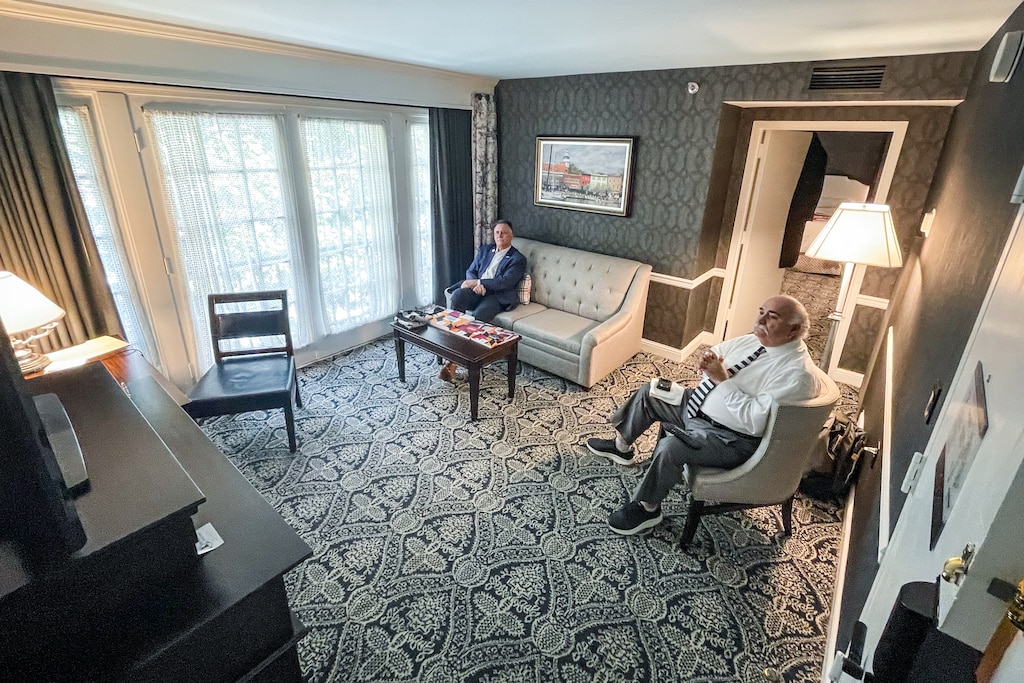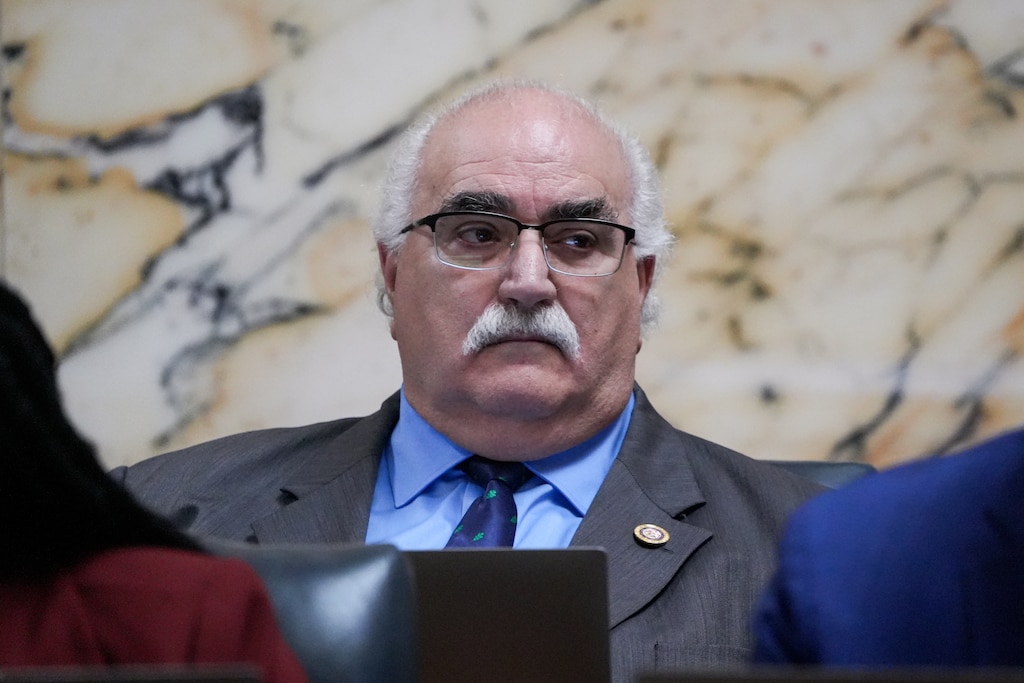Former steelworker and Dundalk Sen. Johnny Ray Salling believes in God, country and Donald J. Trump, though the two Republicans come from starkly different worlds.
Read More
Trump came from money. Salling came from factory workers. Trump built high rises in Manhattan. Salling built rail cars at Sparrows Point. Trump hangs his name on buildings. Salling hangs a photo of Bethlehem Steel’s long gone “L” Furnace on the wall of his Annapolis office.
But the Republicans share a big thing in common — the people who voted for them were voting against someone or against something — and both men won elections fueled by grievance politics. The wave that first carried Trump to office in 2016 began cresting in Salling’s southeastern Baltimore County district a couple years earlier.
Trump took the oath of office Monday inside the U.S. Capitol Rotunda after predicted harsh winter temperatures forced the ceremony inside. Salling and his General Assembly colleague Del. Ric Metzgar planned to attend in person, but instead watched on TV.
The Baltimore Banner thanks its sponsors. Become one.
Salling said he felt “joy” watching Trump return to office, sitting on the edge of the couch as the Rev. Franklin Graham said a prayer.
“We have a future that’s better for our country now,” Salling said, “and with God before us.”

The Maryland senator said America will prosper under a second Trump administration — gas and grocery prices will fall, borders will tighten and international relations will strengthen.
”He will do great things for our country,” Salling said, “because he believes in this country and he believes in the people.”
Salling, 63, has met his political idol a handful of times. They ate crab cakes at Dundalk’s Boulevard Diner during Trump’s first campaign. Salling watched the 2016 Army-Navy Game with Trump in a suite above M&T Bank Stadium. And Salling once traveled to Washington with a cadre of state Republicans to meet with Trump and his staffers during his first term.
The Baltimore Banner thanks its sponsors. Become one.
The devout Christian and lifelong Republican representing Dundalk, Essex and Sparrows Point still marvels that Trump ever gave him “the time of day” during their visits.
If not for their political alignment and Maryland’s proximity to D.C., it’s unlikely their paths would have crossed.
Hoisting the red flag
Democrats sent Salling and a fleet of Republicans to Annapolis in 2014, just two years after Bethlehem Steel’s last blast furnace shut down for good and left thousands of former steelworkers out in the cold. Almost twice as many Democrats cast votes as Republicans.
This part of Maryland, once a booming, industrial hub called Sparrows Point, was reeling from the slow-rolling, decades-long collapse of America’s manufacturing industry. Salling worked for a contractor there for 25 years and said he’d done nearly every job at the steel mill. Giants such as Bethlehem Steel, General Motors, the Glenn L. Martin Company and Lever Brothers in their heydays once employed tens of thousands of union workers.
Those powerful unions bargained for pay high enough that a steelworker with only a high school diploma could buy a house and raise a family on one salary. And as long as those factories kept churning out cars, planes, steel girders and big paychecks, southeast Baltimore County voted reliably blue for decades.
The Baltimore Banner thanks its sponsors. Become one.
But a decline that started slowly sped up in the early 2000s.
Bethlehem Steel declared bankruptcy. Jobs dried up. Families moved. The toppling descent made way for vulture investors to snap up the legendary steel producer and wipe pensions and retirement health care benefits from their balance sheets. Wilbur Ross, Trump’s commerce secretary during his first term, made billions off the pieces of Bethlehem Steel and other mills.
Angered by the losses, the blue-collar workers of Sparrows Point and surrounding communities headed to the polls to punch back with the only weight they had left — their votes.
The once-loyal Democrats in Salling’s district hoisted a red flag, a giant middle finger to cheap foreign labor, global trade policies and the unions and politicians they thought should have saved them.
Across the country, just as in Dundalk, voters have bemoaned a loss of economic mobility, high grocery prices, mounting housing costs and the changing names and faces of their neighbors as waves of immigration washed in. Trump stoked these voters’ frustrations and went two for three in his campaigns for the White House.
The Baltimore Banner thanks its sponsors. Become one.
Bill Barry taught labor union classes at Sparrows Point and has collected more than 100 oral histories and written books about former steelworkers, including those who backed Trump because of the mill closures.
“The anger was enormous — the sense of betrayal,” said the 82-year-old retiree, who was the director of labor studies at the Community College of Baltimore County Dundalk.
People had expected the government to solve their problems, Barry said, and Trump became popular by harnessing their discontent.
“The idea was: You don’t have to do a thing for yourself, I will do it for you,” Barry said, “he played into that passivity.”
‘The wind changed’
Metzgar caught the same red wave that Salling did and represents a portion of the same district in the Maryland House of Delegates.
The Baltimore Banner thanks its sponsors. Become one.
“They were saying: ‘We need a change,’” the 71-year-old said, talking about 2014 voters. Before politics, the Essex Republican ran several small businesses, including a car lot.

It took him three tries before he won. Back in 2006, the unions and the Democrats still had their footing, he recalled. General Motors was still in “survival mode” then, he said, and Bethlehem Steel was limping along.
“They just believed in the union so much,” he said, “that they were going to take care of them.”
But when 2014 came along, he said things just felt different — “The wind changed.”
Salling’s modest campaign won a long-shot contest against Johnny Olszewski Jr., then a state delegate with significant name recognition. He beat Olszewski by just under 700 votes.
The Baltimore Banner thanks its sponsors. Become one.
“I was blown away,” Salling recalled.
Prior to his first election, he said he’d never “indulged” in politics and was never really civically engaged other than knowing who his elected officials were.
“I was not a politician,” he said, “I was not a polished person whatsoever.”
But fellow Republicans had urged him to run. They told Salling if he didn’t know an answer to a question in his debate with Olszewski he should say he was not a politician and would have to get back with his answer, he said.
He became one of a tranche of Republicans to flip the legislative district and councilmanic seat long held by Democrats.
When Trump ran two years later featuring an “America First,” anti-immigration, “Make America Great Again” platform, many in Dundalk and the surrounding areas welcomed the message.
In 2016, 60% of Salling’s district voted for Trump, and has similarly backed him since, according to state election results. These votes didn’t change Trump’s fortunes in Maryland. The deep blue state’s electoral votes have overwhelmingly gone to the Democrat, but some areas that typically vote Republican, and some that don’t, leaned even more red in 2024.
Hopes and aspirations
Olszewski called his 2014 loss to Salling a precursor to the Democratic Party’s result in 2024 and compared the aftermath to now.
“I had a front-row seat to what Democrats are reckoning with,” Olszewski said.
Now a member of Congress, he represents most of Baltimore County and portions of Carroll County and Baltimore City after serving six years as Baltimore County executive.

But he recalled that election. Voters shook his hand and thanked him for doing his job as their state delegate and then told him he wouldn’t get their vote.
When he asked why, they told him they needed to “send a message” to his party.
Olszewski said Democrats failed to communicate to voters that they were still fighting for them, for their health care and access to opportunity.
People in the community had hopes and aspirations, Olszewski said, “They lost their livelihoods in the blink of an eye.”
“When all that is taken away,” he said, “if you are not effectively communicating why it happens and what you’re doing in response to it, the blame is going to go somewhere.”
Most of the politicians that took that blame have moved on. But the thousands of acres left behind by the mills in Salling’s district held valuable assets, key to investors in a shifting global economy.
Railroad tracks, deep water berths, proximity to the Port of Baltimore and I-95, everything corporations needed to sail, mail or rail their products laid in wait. From those ashes of American manufacturing might, global shipping and logistics hub Tradepoint Atlantic was born.
Large corporations like McCormick, Under Armour, Amazon and Home Depot, to name a few, have built massive logistics operations in Sparrows Point. Tradepoint Atlantic has become a key link in the nation’s supply chain and imports goods from all over the world.
The very thing Dundalk voters railed against years ago, and blamed for the loss of their mills — foreign trade — is pumping lifeblood back into their community.
The effort to clean up the site and restore those jobs has spanned all presidential administrations going back to Barack Obama and Maryland governors back to Martin O’Malley, and has been continually supported by both parties in the State House, said Aaron Tomarchio, executive vice president of corporate affairs for Tradepoint Atlantic.
And those jobs stayed local. Of the roughly 13,000 people who work there, most come from eastern Baltimore County and eastern Baltimore, Tomarchio said — “It’s a beautiful testament to what can happen when people work together and put partisanship aside.”
That effort showed up again in the aftermath of the Francis Scott Key Bridge collapse.
Median incomes in Dundalk have risen since the shipping hub created thousands of new jobs. Many, though, such as with Amazon, are non-union. The average home value still lands well below the state’s average, and fewer than 15% have college degrees, according to census data.
An open line to D.C.?
Back at the Governor Calvert House, where Metzgar stays during the session, both men listened intently when Trump listed what he planned to do, such as halt immigration, send troops to the southern border and lower consumer costs. When Trump proposed a federal policy that there be two genders, male and female, Salling clapped. And when Trump said he would “drill baby drill,” they chuckled.
“He said he was going to do it, now he’s doing it,” Salling said.
Trump spoke directly to Salling, Metzgar and the people they represent, praising them as “pioneers who pushed onward, marched forward and let no obstacle defeat their spirit or their pride. Together, they laid down, the railroads, raised up, the skyscrapers, built great highways, won the World Wars, defeated fascism.”
Salling said he’s not concerned like many Democrats in the General Assembly that Trump’s administration will shunt federal funds committed to the state or limit Marylanders’ health care access. He does think, though, that the Democrats should do what they can to work with the president.
“I think they need to really take a step back and reevaluate how you can benefit from this administration,” Salling said.

Trump and his advisers have said they plan to downsize the federal government and pay for tax cuts by cutting government benefit programs.
Salling said he’s already spoken with Rep. Andy Harris, the Republican congressman from Maryland’s 1st District, about how he and his Republican colleagues in the General Assembly can reconnect with Trump.
When he visited the White House during Trump’s first term, he left with phone numbers of people he could call when his constituents needed help from Trump’s government, whether it be for health care access or help resolving a tax issue with the Internal Revenue Service.
He said, “We’re hoping that that avenue will be open again.”




Comments
Welcome to The Banner's subscriber-only commenting community. Please review our community guidelines.